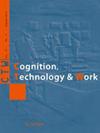Ergonomics and aging: A bibliometric analysis.
IF 3.4
3区 工程技术
Q2 ENGINEERING, INDUSTRIAL
引用次数: 0
Abstract
BACKGROUND Despite the prevalence of publications focusing on the trends of the studies on ergonomics, the information of the aging focused studies within these publications is limited. OBJECTIVE This study aims to provide general information regarding the trends of the studies on ergonomics and aging by using bibliometric analysis techniques and to provide a general view regarding to the development of this field. METHODS The bibliometric data of the publications on ergonomics and aging were retrieved from the WOS Database and analysed by using the Bibliometrix extension of the R Packet Programme. For the visualisation of the bibliometric data, the Vosviewer programme was used. RESULTS Analysis results of the 405 papers published between the years of 1979 and 2020 show that main themes were digital human modelling, design for all, workplace ergonomics, transport and vehicle design, kitchen design, human factors, care and vision in old age. CONCLUSIONS The content of the studies on ergonomics and aging changed from basic elements of ergonomic design for older people to the investigations about computer-aided applications and the effect of the developing technology. Therefore, it can be said that the studies on ergonomics and aging are changing parallel to the development of the technology.人体工程学与老龄化:文献计量学分析。
背景尽管关注人体工程学研究趋势的出版物很普遍,但这些出版物中关注老龄化研究的信息有限。目的运用文献计量学分析技术,了解人体工程学与老龄化研究的发展趋势,并对该领域的发展提出总体看法。方法从WOS数据库中检索人类工效学和老龄化相关文献计量数据,采用R包程序的Bibliometrix扩展进行分析。为了使文献计量数据可视化,使用了Vosviewer程序。结果对1979 - 2020年间发表的405篇论文的分析结果表明,主要主题是数字人体建模、全民设计、工作场所人体工程学、交通与车辆设计、厨房设计、人为因素、老年护理与视觉。结论人机工程学与老龄化的研究内容从老年人人机工程学设计的基本要素转向计算机辅助应用和发展技术影响的研究。因此,可以说,人体工程学和老龄化的研究与技术的发展是同步变化的。
本文章由计算机程序翻译,如有差异,请以英文原文为准。
求助全文
约1分钟内获得全文
求助全文
来源期刊

Cognition Technology & Work
ENGINEERING, INDUSTRIAL-
CiteScore
6.90
自引率
7.70%
发文量
26
审稿时长
>12 weeks
期刊介绍:
Cognition, Technology & Work focuses on the practical issues of human interaction with technology within the context of work and, in particular, how human cognition affects, and is affected by, work and working conditions.
The aim is to publish research that normally resides on the borderline between people, technology, and organisations. Including how people use information technology, how experience and expertise develop through work, and how incidents and accidents are due to the interaction between individual, technical and organisational factors.
The target is thus the study of people at work from a cognitive systems engineering and socio-technical systems perspective.
The most relevant working contexts of interest to CTW are those where the impact of modern technologies on people at work is particularly important for the users involved as well as for the effects on the environment and plants. Modern society has come to depend on the safe and efficient functioning of a multitude of technological systems as diverse as industrial production, transportation, communication, supply of energy, information and materials, health and finance.
 求助内容:
求助内容: 应助结果提醒方式:
应助结果提醒方式:


